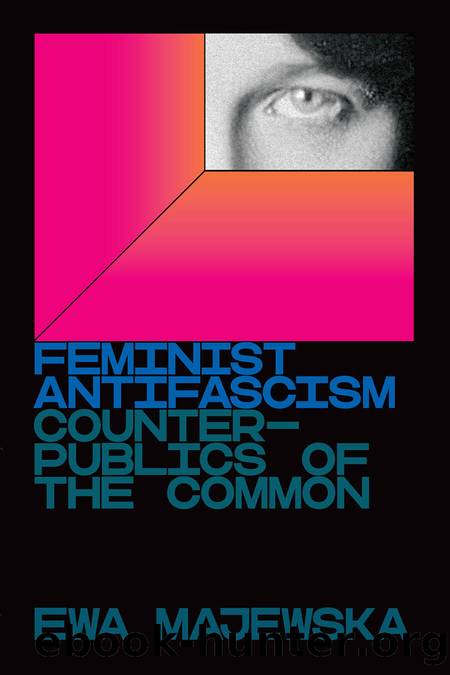Feminist Antifascism: Counterpublics of the Common by Ewa Majewska

Author:Ewa Majewska
Language: eng
Format: epub
Publisher: Verso
4
Weak Resistance:
Beyond the Heroic Model of Political Agency
Feminist art theory has contested the male-dominated politics of representation. Several important interventions in this context have been taken by feminist scholars and activists, one of the most famous in Linda Nochlinâs essay âWhy Have There Been No Great Women Artists?â, published in 1971. Spoiler alert: there could not have been any, because the very figure of artist was shaped according to male socialization and masculine roles. 1 The question does not allow us to address such reasoning, thus condemning those who seek the answer to search in the wrong direction.
A similar question could be asked regarding politics. Today such a question would already sound out of place in countries like Finland, where the 2020 government is composed of five parties run by women and a prime minister who is a thirty-five-year-old woman and a child of a lesbian couple. However, in many other countries, sadly, such a question is not completely dated, and it could be built in a similar way to that about women artists: âWhy Have There Been No Great Women Politicians?â The historically accurate answer, also one politically hopeful, would be: because the most popular models of political agency have been shaped according to masculine socialization and male role models. In both sectors, women have also been quite explicitly, often by law, excluded. Nochlin rightly argued that in order to answer such questions, one should prove the opposite by finding examples of women who actually were artists or politiciansâas the answer to my question above would suggest. The task is to turn the tables and shift the perspective, otherwise the conditions of womenâs exclusion from various sectors of human life will remain invisible.
The notion of weak resistance, which I have been working on for years, introduces such a shift in the context of counterpublicsâ political agency. 2 This concept embraces various aspects of the perspectives and agencies of different oppressed and marginalized groups while also capturing certain elements of the dynamics of the multitude becoming the common (possibly in revolt). In my research, it proved to be an interesting shift from the patriarchal, heroic vision of agency, still so expansively dominating our political imagination and theory. It is to some extent inspired by Walter Benjamin, whose idea of âweak messianism,â briefly mentioned in his âTheses on the Philosophy of History,â remains inspiring for several philosophers, such as Gianni Vattimo, whose theory of âweak thoughtâ fueled some currents of deconstruction; Jacques Derrida, whose Specters of Marx explains the non-mystical signification of Benjaminâs idea; or Boris Groys, whose essay âThe Weak Universalismâ argues for a revision of the understanding of avant-garde. 3 In this chapter I discuss its main elements and consider some other inspirations, such as Jack Halberstamâs The Queer Art of Failure, Vaclav Havelâs The Power of the Powerless, James Scottâs Weapons of the Weak and the notion of âterritoryâ in Gilles Deleuze and Félix Guattariâs A Thousand Plateaus. Methodologically, this chapter perhaps owes most to the work of Donna Haraway, particularly her perspective on situated knowledges, the cyborg and the Capitalocene.
Download
This site does not store any files on its server. We only index and link to content provided by other sites. Please contact the content providers to delete copyright contents if any and email us, we'll remove relevant links or contents immediately.
| Anthropology | Archaeology |
| Philosophy | Politics & Government |
| Social Sciences | Sociology |
| Women's Studies |
On the Front Line with the Women Who Fight Back by Stacey Dooley(4311)
The Lonely City by Olivia Laing(4120)
The Rules Do Not Apply by Ariel Levy(3905)
Bluets by Maggie Nelson(3710)
The Confidence Code by Katty Kay(3566)
Three Women by Lisa Taddeo(2920)
Inferior by Angela Saini(2831)
A Woman Makes a Plan by Maye Musk(2830)
Pledged by Alexandra Robbins(2790)
Not a Diet Book by James Smith(2726)
Confessions of a Video Vixen by Karrine Steffans(2674)
Nice Girls Don't Get the Corner Office by Lois P. Frankel(2594)
Wild Words from Wild Women by Stephens Autumn(2589)
Brave by Rose McGowan(2501)
The Girl in the Spider's Web: A Lisbeth Salander novel, continuing Stieg Larsson's Millennium Series by Lagercrantz David(2381)
The Clitoral Truth: The Secret World at Your Fingertips by Rebecca Chalker(2242)
Why I Am Not a Feminist by Jessa Crispin(2239)
Women & Power by Mary Beard(2224)
Women on Top by Nancy Friday(2121)
